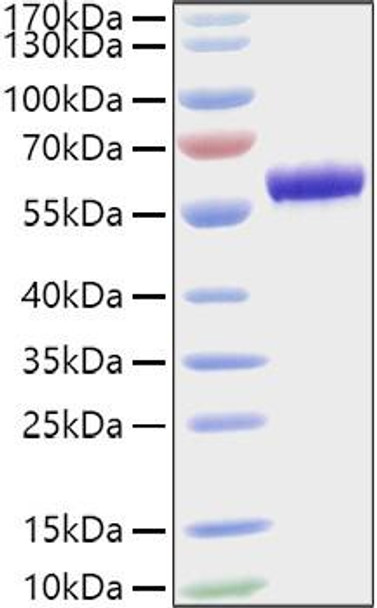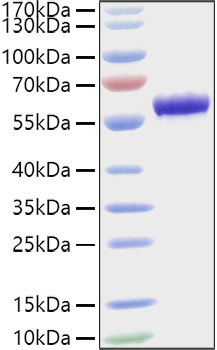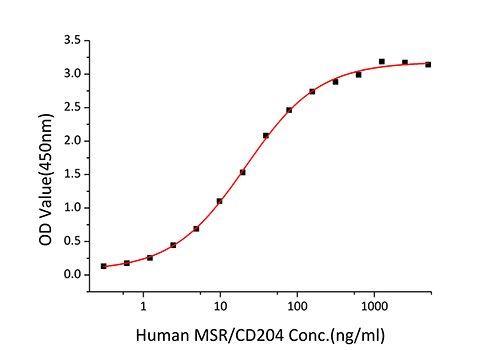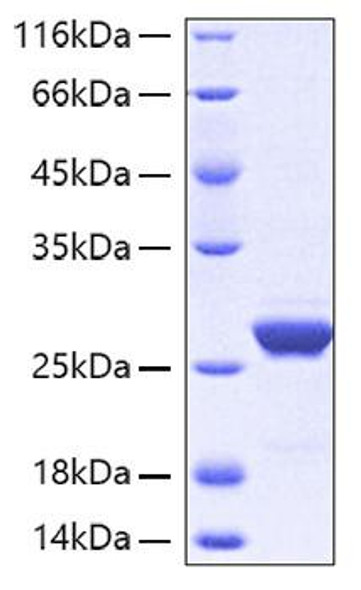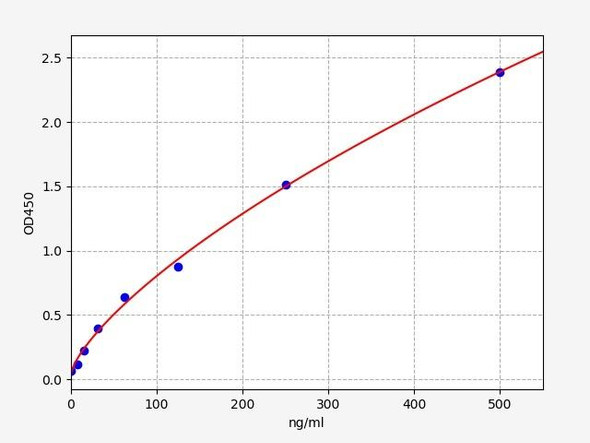Description
Recombinant Mouse Apolipoprotein A-I/APOA1 Protein
The Recombinant Mouse Apolipoprotein A-I/APOA1 Protein is a high-quality recombinant protein designed for murine biological research applications. This protein serves as an essential reagent in mouse model studies, comparative immunology research, and preclinical therapeutic evaluations, enabling scientists to investigate Apolipoprotein A-I/APOA1 biology and its relevance to human disease mechanisms through translational research approaches.
This product (SKU: RPCB1037) is produced using HEK293 cells and features a C-hFc tag for convenient detection and purification. The protein exhibits a calculated molecular weight of 53.91 kDa with an observed molecular weight of 60-65 kDa under denaturing conditions, achieving ≥ 95 % as determined by SDS-PAGE.. Functional bioactivity has been validated through rigorous quality control assays, confirming its suitability for demanding research applications.
Key Features
| High Purity by Affinity Chromatography | |
| Mammalian & Bacterial Expression Systems | |
| High lot-to-lot consistency via strict QC |
| Product Name: | Recombinant Mouse Apolipoprotein A-I/APOA1 Protein |
| SKU: | RPCB1037 |
| Size: | 10 μg , 20 μg , 50 μg , 100 μg |
| Reactivity: | Mouse |
| Synonyms: | Sep2, Alp-1, Ltw-1, Sep-1, Sep-2, Apoa-1, Brp-14, Lvtw-1, apo-AI, apoA-I, APOA1 |
| Tag: | C-hFc |
| Expression Host: | HEK293 cells |
| Calculated MW: | 53.91 kDa |
| Observed MW: | 60-65 kDa |
| Gene ID: | 11806 |
| Protein Description: | High quality, high purity and low endotoxin recombinant Recombinant Mouse Apolipoprotein A-I/APOA1 Protein (RPCB1037), tested reactivity in HEK293 cells and has been validated in SDS-PAGE.100% guaranteed. |
| Endotoxin: | < 1 EU/μg of the protein by LAL method. |
| Purity: | ≥ 95 % as determined by SDS-PAGE. |
| Formulation: | Lyophilized from a 0.22 μm filtered solution of PBS, pH 7.4. |
| Bio-Activity: | Measured by its binding ability in a functional ELISA. Immobilized Mouse A-I/APOA1 at 5μg/mL (100 μL/well) can bind Human MSR1/CD204 with a linear range of 1-21.4ng/mL. |
| Reconstitution: | Centrifuge the vial before opening. Reconstitute to a concentration of 0.1-0.5 mg/mL in sterile distilled water. Avoid vortex or vigorously pipetting the protein. For long term storage, it is recommended to add a carrier protein or stablizer (e.g. 0.1% BSA, 5% HSA, 10% FBS or 5% Trehalose), and aliquot the reconstituted protein solution to minimize free-thaw cycles. |
| Storage: | Store at -20℃.Store the lyophilized protein at -20℃ to -80 ℃ up to 1 year from the date of receipt. After reconstitution, the protein solution is stable at -20℃ for 3 months, at 2-8℃ for up to 1 week. |
Apolipoprotein A1 (APOA1) is a member of the apolipoprotein family whose members are proteins bind with lipids and form lipoproteins to translate these oil-soluble lipids such as fat and cholesterol through lymphatic and circulatory system. APOA1 is the main component of high density lipoprotein (HDL) in plasma and is involved in the esterification of cholesterol as a cofactor of lecithin-cholesterol acyltransferase (LCAT) which is responsible for the formation of most plasma cholesteryl esters, and thus play a major role in cholesterol efflux from peripheral cells. As a major component of the HDL complex, APOA1 helps to clear cholesterol from arteries. APOA1 is also characterized as a prostacyclin stabilizing factor, and thus may have an anticlotting effect. Defects in encoding gene may result in HDL deficiencies, including Tangier disease, and with systemic non-neuropathic amyloidosis. Men carrying a mutation may develop premature coronary artery disease.

